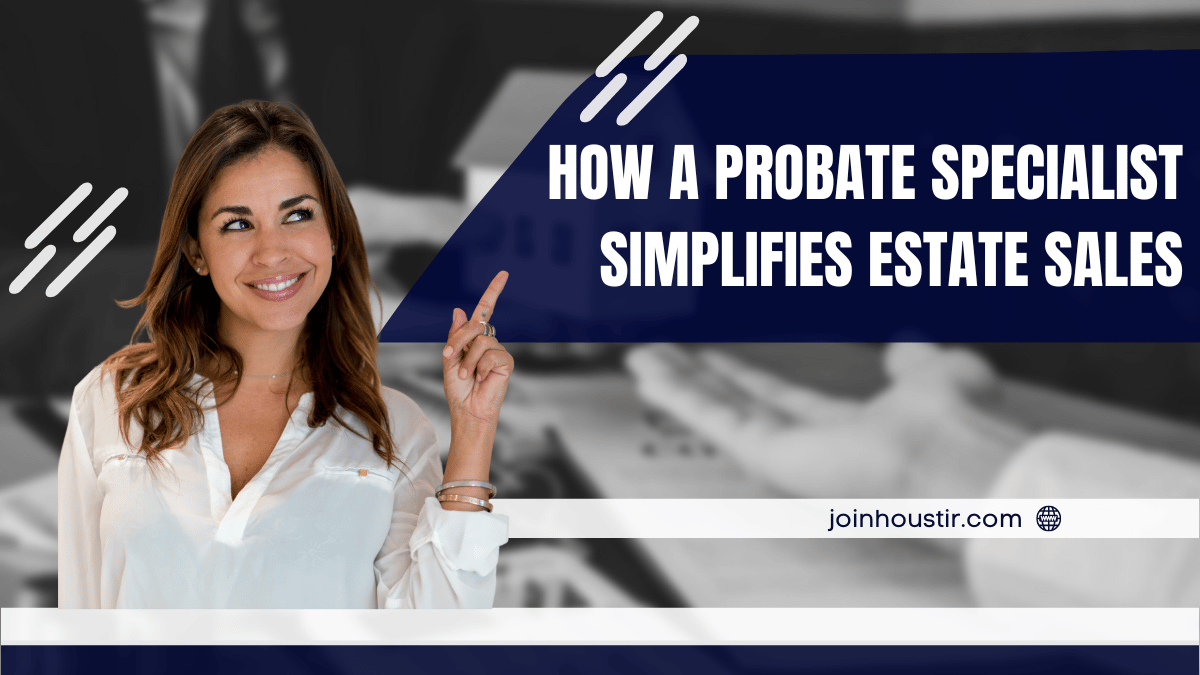Navigating probate real estate sales can be a complex and time-consuming process, filled with legal requirements, court oversight, and emotional strain. When someone passes away and leaves behind real estate, the property must go through probate—a legal process to distribute the deceased’s assets. This is where a probate specialist becomes invaluable. With expertise in both real estate and probate law, they help executors and families manage estate sales more efficiently, avoiding legal pitfalls while ensuring a smooth transaction.
In this guide, we’ll explore what a probate specialist does, why probate real estate sales differ from traditional transactions, and how they can simplify the process for executors and heirs.
What is a Probate Specialist?
A probate specialist is a real estate professional who specializes in assisting with the sale of properties involved in the probate process. Their expertise goes beyond that of a regular real estate agent, as they are well-versed in probate laws, court procedures, and estate management. They work closely with probate courts, executors, and beneficiaries to ensure the property is sold in accordance with legal requirements.
Key Roles of a Probate Specialist:
- Legal Guidance: They understand the intricate legal requirements involved in probate real estate sales, including handling court filings, deadlines, and documentation.
- Executor Support: A probate specialist works closely with the executor of the estate, providing guidance on the sale process and ensuring compliance with court mandates.
- Market Expertise: They assess the property’s market value, prepare it for sale, and ensure it’s listed appropriately to attract the right buyers.
Why Probate Sales Are Different from Traditional Real Estate Sales
Probate real estate transactions are far more complicated than typical home sales. The involvement of the probate court, along with the need to satisfy multiple heirs and handle debts, can create a challenging environment for the sale of the property. Unlike regular real estate transactions, probate sales must follow legal procedures, and each step is subject to court approval.
Key Differences:
- Court Involvement: Probate sales require approval from a judge, which can lengthen the process significantly.
- Multiple Stakeholders: Besides the executor, probate sales often involve multiple heirs or beneficiaries, each with their own interests and opinions on the sale.
- Legal Paperwork: There is a significant amount of paperwork required, including petitions to sell the property, notices to creditors, and court-ordered appraisals. A probate specialist ensures all this paperwork is completed correctly and on time.
Common Challenges in Probate Real Estate Sales:
- Time Delays: Probate cases can take months or even years to resolve, especially if disputes arise among heirs or beneficiaries.
- Title Issues: Often, probate properties have title issues that need to be resolved before the sale can proceed.
- Emotional Stress: Selling a property after a loved one’s passing is emotionally draining for families, and the complexity of probate can add to the stress.
How a Probate Specialist Helps with Estate Sales
The expertise of a probate specialist is crucial for making the estate sale as smooth as possible. Their role involves managing the legal complexities of probate, coordinating with the court and heirs, and ensuring the property is marketed and sold efficiently.
1. Managing Legal Paperwork
One of the primary responsibilities of a probate specialist is managing the legal paperwork required for a probate sale. This includes filing petitions with the probate court, handling title issues, and ensuring all necessary notices are given to creditors and beneficiaries. Properly managing these tasks is essential to avoid delays or legal complications.
2. Coordinating with the Executor and Heirs
The probate specialist serves as a neutral party who facilitates communication between the executor and the heirs. This coordination ensures that all parties are informed and agree on how the property is being handled, whether it’s listing the home for sale or accepting an offer. In some cases, multiple heirs may have conflicting interests, and the probate specialist can help mediate these disputes.
3. Pricing and Marketing the Property
One of the most critical aspects of selling a probate property is setting the right price. A probate specialist will perform a comprehensive market analysis to determine the home’s value based on current market conditions and comparable properties. They’ll then create a marketing strategy to attract potential buyers, often focusing on investors or buyers familiar with probate transactions.
Probate specialists understand how to navigate the unique market for probate properties and use targeted advertising to reach serious buyers who are prepared for the legal intricacies involved.
4. Working with the Probate Court
Navigating the probate court process is one of the most complex aspects of a probate sale. A probate specialist will handle all necessary filings, petitions, and court appearances to ensure that the sale is approved by the court and proceeds without unnecessary delays. This includes submitting offers to the court for approval, ensuring that all creditors are notified, and meeting court deadlines.
The Process of Working with a Probate Specialist
When hiring a probate specialist, the sale of a probate property typically follows a structured process to ensure compliance with legal requirements while maximizing the property’s value.
1. Initial Consultation
The process begins with an initial consultation between the probate specialist and the executor. During this meeting, the specialist will assess the situation, review the probate documents, and develop a plan for selling the property. They will also provide an estimated timeline for the sale, depending on the complexity of the estate.
2. Property Evaluation and Appraisal
Once the initial consultation is completed, the probate specialist will arrange for a professional appraisal of the property. This appraisal is required by the probate court to determine the fair market value of the home. Based on the appraisal and market conditions, the probate specialist will recommend a listing price.
3. Marketing and Listing the Property
After determining the property’s value, the probate specialist will develop a marketing plan. This typically includes listing the property on real estate websites, running targeted online ads, and leveraging their network of investors and buyers interested in probate properties. The goal is to generate competitive offers while adhering to court guidelines.
4. Negotiating Offers and Closing the Deal
Once offers are received, the probate specialist will negotiate with potential buyers while ensuring that the sale complies with court requirements. The highest offer will typically be presented to the court for approval. Once the court approves the sale, the probate specialist will coordinate the closing process, ensuring that all legal, financial, and logistical aspects are handled correctly.
Benefits of Hiring a Probate Specialist
The complexities of probate real estate sales make hiring a probate specialist an essential step for executors and heirs. Here are some key benefits:
1. Expertise in Legal Matters
Probate specialists understand the intricacies of probate law and the court system, ensuring that all legal obligations are met without delays or mistakes. This expertise helps avoid common pitfalls, such as missed deadlines or improperly filed documents, which can prolong the sale.
2. Time Savings
By managing the legal requirements and handling communication with the court, a probate specialist significantly reduces the time it takes to sell a probate property. Their experience allows them to streamline the process and navigate the legal system efficiently.
3. Maximizing Property Value
A probate specialist uses their market knowledge to ensure the property is priced correctly and marketed to the right buyers. This helps maximize the value of the property, ensuring that the estate receives the highest possible return.
4. Avoiding Common Pitfalls
Probate real estate sales can be fraught with legal issues, disputes among heirs, and title problems. A probate specialist helps avoid these pitfalls by ensuring that the sale complies with all legal requirements and that any potential issues are addressed early in the process.
When Should You Hire a Probate Specialist?
There are several situations where hiring a probate specialist is crucial:
- Complex Estates: If the estate involves multiple properties, large debts, or legal disputes among heirs, a probate specialist is essential for managing these complexities.
- Disputed Wills: If there is a contested will or disagreements among heirs, a probate specialist can help mediate these disputes while keeping the sale on track.
- Out-of-State Executors: When the executor lives in a different state than the property, a probate specialist can handle the local aspects of the sale, including court appearances and property management.
Conclusion
Selling a property through probate is a complex and often lengthy process, but a probate specialist can simplify it by managing the legal requirements, coordinating with the court and heirs, and ensuring that the property is sold for its full market value. For executors and families dealing with the loss of a loved one, hiring a probate specialist offers peace of mind and ensures that the sale proceeds as smoothly as possible.
Frequently Asked Questions (FAQs)
- What is the difference between a probate specialist and a regular real estate agent?
A probate specialist has expertise in probate law and court procedures, while a regular agent may not have the necessary legal knowledge for probate transactions. - How long does it typically take to sell a probate property?
The timeline for probate sales varies depending on the court’s schedule and the complexity of the estate, but it can take several months to a year. - What are the costs associated with hiring a probate specialist?
Probate specialists typically charge a percentage of the sale price, which is approved by the probate court. Additional legal fees may also apply. - How do probate specialists ensure legal compliance during a sale?
Probate specialists handle all necessary filings, petitions, and court communications to ensure the sale complies with probate laws. - Can a probate specialist help resolve disputes among heirs?
Yes, probate specialists often mediate disputes among heirs and ensure that the sale… moves forward smoothly.
Frequently Asked Questions (FAQs)
- What is the difference between a probate specialist and a regular real estate agent?
A probate specialist is trained in probate law and real estate, while a typical real estate agent may not be familiar with the court process and legalities involved in probate sales. - How long does it typically take to sell a probate property?
The process can take anywhere from a few months to a year, depending on court proceedings and the complexity of the estate. - What are the costs associated with hiring a probate specialist?
Probate specialists typically charge a commission similar to standard real estate agents, but there may also be additional legal fees related to the probate process. - How do probate specialists ensure legal compliance during a sale?
They handle all court filings, legal notices, and required documentation to ensure that the sale complies with probate laws and deadlines. - Can a probate specialist help resolve disputes among heirs?
Yes, probate specialists often act as mediators, helping to resolve disagreements among heirs to facilitate a smoother property sale.






